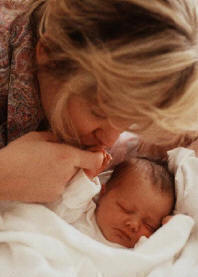Bringing Baby Home |
|
 |
|
|
Your newborn goes
through a lot right after heís born. Whether the
birth was natural or assisted, he experiences a
great deal of stress as he copes with the abrupt
change in the world as he knows it.
The first days home with baby can be trying. If you stay calm, however, these simple tips
will ease the transition for both of you.
More |
|
|
|
 |
Baby's Naptime |
 |
If you baby is not napping well during her first few months of life, you may
want to try to cut back on the time she is awake by 15 minute increments. |
|
If she is
getting over-stimulated, then she will fight
sleep and be difficult to get to nap.
More |
|
|
|
|
Bath
Time For Baby |
|
Bath time is a special time of bonding
with a baby and her parents. |
 |
|
Itís a time to play gently, talk and
sing. Get everything you will need
ready before you start! Here's a
list of things you should have ready...
More |
|
|
 |
Breastfeeding Basics |
|
 |
Breast milk is the best food
you can give to your baby.
Once you've given birth breast feeding is the single
most important |
|
thing you can do to protect your baby
and help to promote good health. Best of all, breast
feeding is free.
Along with saving you money on HMR (Human Milk
Replacement), breast feeding can also help you to keep your medical bills down.
Babies that
are fed
with formula get sicker more often and more seriously
than babies that are breast fed They also have more
ear infections, respiratory infections, and other
problems.
More |
|
|
|
|
What Every Parent Needs To Know |
|
 |
I t
starts the day you bring your newborn
home...
Every parent
wants to make sure they provide for their
child the best they can. Every day of their
young lives. But infants don't come home
from the hospital with a manual.
Loving your
child is the easy part. |
|
Making sure you
raise them to the best of your ability is
not. When every person you turn to has an
opinion about where to put your baby's
cradle, to listen to their crying or to
ignore it...
With so much
information out there, it's important for
you as a parent to make sure you take the
time to learn how to care for a child. You
and only you can do this for yourself. But,
we can help.
"Easy Motherhood"
Click here to read
more |
|
|
|
|